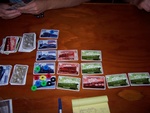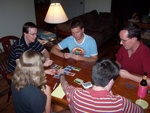
|
Station Master A game by Chris Bayliss Published by Mayfair Games, Inc. Players: 2 to 6 Time: 30-45 minutes Reviewed by Susan Rozmiarek |

|
Station Master is a quick and simple card game of tactics and bluffing. Players are "Station Masters" who assign carriages and passengers to trains, hoping to score points as the trains leave the station.
Components:
- 112 cards, each depicting an engine, carriage, or special action
- 36 passenger tokens, 6 of each player color. These are small poker chips with the Mayfair logo stamped on one side and a number from 1 to 3 on the other side.
- Rules - printed in black and white on rather flimsy paper.
- Plastic tray to organize components
Game play:
The cards are sorted into two piles, with Engine cards in one pile and Station Master cards -
carriages and special cards - in the other.
Players each have a set of tokens (small poker chips) with a number from 1-3 on each, representing passengers.
They also start with a hand of three Station Master cards.
At the start of the game, a number of Engine cards equal to the number of players are laid out on the table. Each Engine card has a number on it that represents both the number of passenger tokens it can hold and the number of carriages it can pull. On a player's turn, he may add a facedown passenger token to an Engine card, add a carriage card to an Engine on the table, or play a Special card (more about them below). If he plays a card, he draws a new one from the Station Master deck to add to his hand.
Carriage cards have a negative or positive value on them. Once a train has the maximum number of carriages, it "leaves the station" and is scored. The numbers on the carriages are added up to get the train's value. The passenger tokens are revealed and the players add up the values on their tokens and multiply by the train's value to get their score for that train. Players then get their tokens back to be played again on another train. There are a few special trains that add some simple scoring twists as well. The Engine and Carriage cards for the scored train are placed in a discard pile, and a new Engine card is drawn from the Engine deck to replace it. There is a special card in the deck, "Rush Hour," that when drawn, adds another Engine card to the total on the table. The game ends when the last train is scored. The player with the highest total wins the game.
There are seven different types of Special cards that do a variety of things. These include allowing a train to leave the station early, removing, adding or shuffling passengers and carriages around, and changing a train's scoring. They add a lot of flavor, but they also add a lot of chaos to the game.
Discussion:
The game reminds me a bit of an older Knizia game, Auf Heller und Pfennig, but with even more "take that!"
plays due to the numerous Special cards.
It has the same feel with the timing of not wanting to commit your tokens too early lest you get
targeted by everyone else, yet trying to commit early enough to get in on the high scoring trains.
Unlike Auf Heller, there is a bluffing element with the tokens being placed facedown.
I like the bluffing, but it would have been nice to have a zero valued token to use to
try and throw people off even more.
I also found it quite cumbersome to keep score.
We kept a running total on a piece of paper, but the game moves so quickly that it
is hard for the scorekeeper to keep up.
Keeping a running total also encourages a great deal of bashing on the current leader.
I think I would like to try adding all the scores at the end of the game instead of keeping a running total.
Overall though, I found the game to be fun and fast. There is a heavy dollop of chaos and not a whole lot of control, but for a short, light game, I don't necessarily consider those characteristics to be a bad thing. The game is simple enough for family play and is also short enough to make a good lunchtime game. The fact that it handles up to six players is also a plus. While I wouldn't call it spectacular, Station Master is a decent, solid lightweight game that will definitely see playing time in both my family and adult gaming group.
| Other Web information: |
This page viewed
E-mail Ed Rozmiarek with questions or problems concerning this page.
Copyright © 2004, Ed & Susan Rozmiarek No portion of this website may be reproduced or copied without the consent of Ed or Susan Rozmiarek.


